A Revolution of Values in the Marketplace
 Paul T. Jones
Paul T. Jones
Founder, Co-Chairman
Chief Investment Officer
Tudor Investment Corporation
Martin Whittaker
Chief Executive Officer
JUST Capital
For the simple truth is that capitalism is leaving too many behind and needs to be reshaped to reflect the needs of all people. The chart below makes plain the direct correlation between national income inequality levels (on the horizontal axis) and a multitude of social, health and economic ills (represented vertically). In his “Revolution of Values” speech in 1967, Dr. Martin Luther King, Jr. said, “A true revolution of values will soon cause us to question the fairness and justice of many of our past and present policies.” The makings of such a revolution are now underway in the capital markets, and not a moment too soon.
Source: Just Capital (2015) based on Wilkinson & Pickett, The Spirit Level (2009)
Clearly, the United States is in a league of its own when it comes to the breadth and depth of the challenges it faces. Left unchecked, unjust corporate behavior becomes a primary driver of inequality. It undermines public trust in the profit motive and gives rise to the deep sense of unfairness that currently pervades our society. Business decisions that benefit humanity but not next quarter’s earnings are increasingly met with suspicion, derision and resistance. It’s as if investing in employee well being, customer loyalty, workplace diversity, fair pay, community prosperity, and environmental vitality is allowable only if it immediately boosts share prices.
At JUST Capital, we believe that to build a better future for everyone, we have to shift the immense resources and ingenuity of the massive private sector onto a more balanced, more just course. Our strategy for doing this is to use market forces, and the power of information, to incentivize and reward more just behavior at the largest, publicly-traded companies in the country. Large companies employ tens of millions of people, generate trillions of dollars in profit, provide healthcare to the majority of Americans, exert immense influence over the US economy and affect the lives of millions of working families, both directly and via their supply chains.
Through our survey work and public ranking platform, we track how corporations perform on the issues that we, as Americans, truly care about. The JUST rankings, index and analytics empower ordinary people to support, buy from, invest in, protest, work for, or otherwise engage with the companies that align most closely with their own particular values.
Not only is this engagement of ordinary citizens consistent with our democratic principles, we believe it is also the best way to create the kinds of incentives and rewards that drive business behavioral change. To put this in perspective, shifting a mere 1% of total consumer and corporate spending onto a more just course would channel some $250 billion dollars (the same amount Americans contribute to charity each year) toward solving the major challenges we face as a nation.
The results of our survey work, which to date has reached over 50,000 Americans, show emphatically that we place people, especially workers, above all else. And when it comes to defining corporate justness, it is clear that how companies pay and treat their workers are the dominant issues. This holds true for Americans at all income levels, of all ages and backgrounds, and across the political spectrum.
Returning to the core theme of the 2017 State of Black America, ‘Protecting Our Progress,’ it is surely true that we cannot successfully accomplish this if we cannot first solve for another critical determinant of justness: paying workers a living wage. As defined by MIT’s calculator, the living wage is a market-based and geographically-specific measure of a family’s basic needs: food, housing, childcare, health insurance, transportation, and other necessities. Sadly, in many American communities, families working low-wage jobs do not make a sufficient income to meet these needs.
A Living Wage Map of America in 2017 (JUST Capital & MIT)
Workers in the fast food, consumer services and retail sectors are particularly hard hit. JUST’s analysis has shown that some five million of the six million workers at the largest retailers in the country do not make a living wage in the counties where they work. Almost 40% make less than $15/hour. On top of that, the largest retailers are receiving $48.3 billion in wage subsidies per year through the Earned Income Tax Credit (EITC), food stamps (SNAP), Medicaid, and ACA premium support programs.
Our analysis also shows how the shifting sands of retail employment are hitting some counties especially hard. The job cuts and store closings at traditional department stores over the past five years—Macy’s, Sears/K-Mart and JC Penney—may have been offset by new jobs created at Amazon, however, these jobs are not like for like. The net benefit for workers in the 87 counties where Amazon warehouses are opening means little for retail workers in the 994 counties where brick and mortar stores are being shuttered.
Job Losses at Traditional Retail Stores (Red) versus Job Gains at Amazon (Blue) Across the US (JUST Capital 2017)
The silver lining in all this, and one of the key takeaways from our work, is that being just is good for business and good for shareholders alike. Our JUST 100 Index, a collection of the best performing companies in America, presents a new kind of investable benchmark for corporate performance based on the public’s, not Wall Street’s, priorities: living wage, community health, job creation, labor standards, the environment, fair pay, gender equity and more. These top-ranked “America’s Most JUST Companies” have outperformed their peers by an average of about 8% annually since 2006 and generated 3.5% higher 5-year Return on Invested Capital.
5-Year Performance of the Current JUST 100*
These leaders also:
- pay 20% more workers a living wage
- have 16.6% more women board members
- created 1.8x more jobs in America
- pay 8x fewer consumer-related fines
- recycle about 3x more waste in % terms, and
- donate about 2x as much of their profit to charity
In other words, JUST 100 companies pay more employees a living wage, show higher employee compensation satisfaction, and score higher on fair pay. The punchline is clear—contrary to popular belief, higher pay in no way precludes strong financial return. And every $1 increase in wages enables approximately 2.5 million more workers to make a living wage.
In Democracy in America, de Tocqueville writes, “In nations as well as individuals . . . it is more common to see the very imminence of danger act as a midwife to extraordinary virtues.” Across America, and across the world, we are indeed facing dangerous times; but we are also on the cusp of the birth of extraordinary virtues and great deeds. And like all births, it will be messy and loud but ultimately full of beauty and hope.


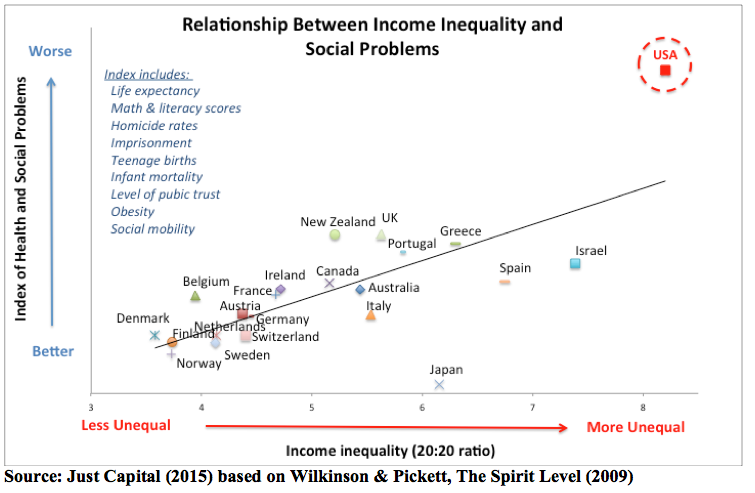
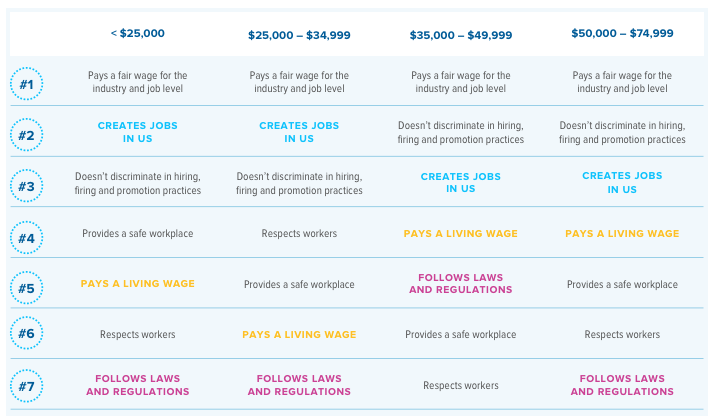
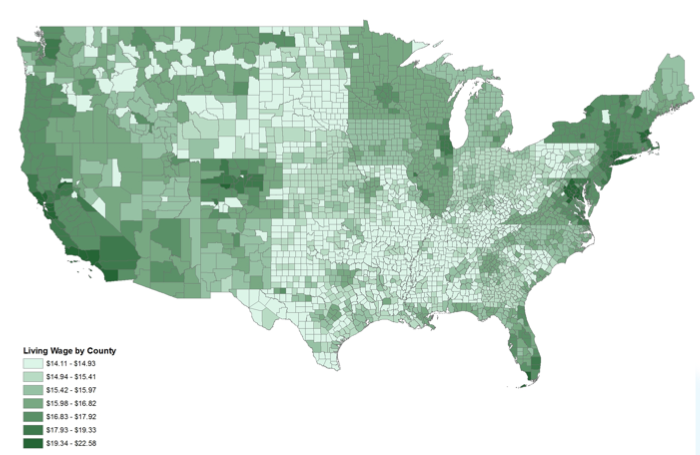
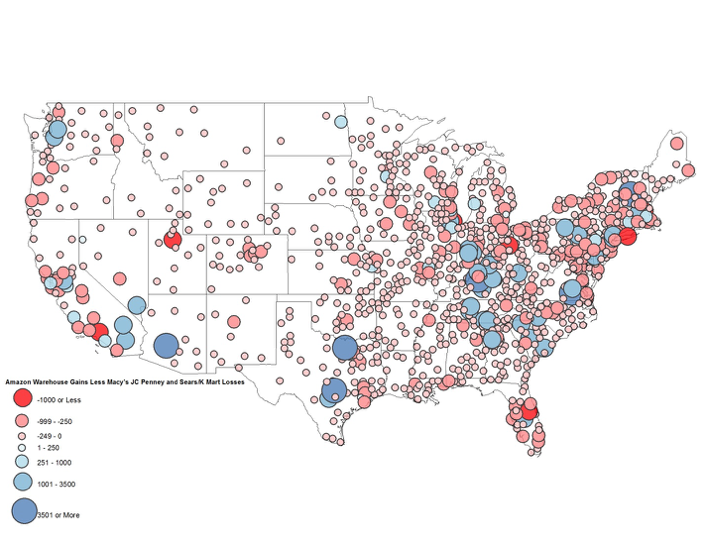
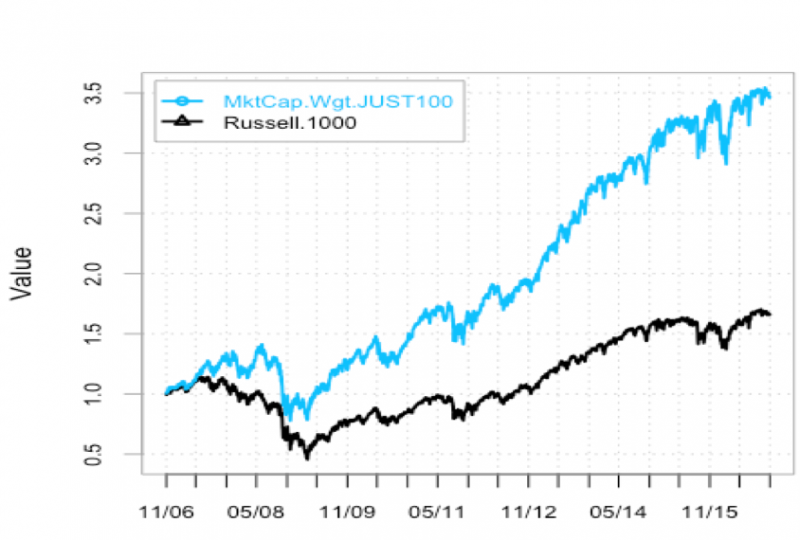

 Equality Index
Equality Index  Senate Report
Senate Report  2020 SOBA Essays
2020 SOBA Essays  2019 Report
2019 Report 